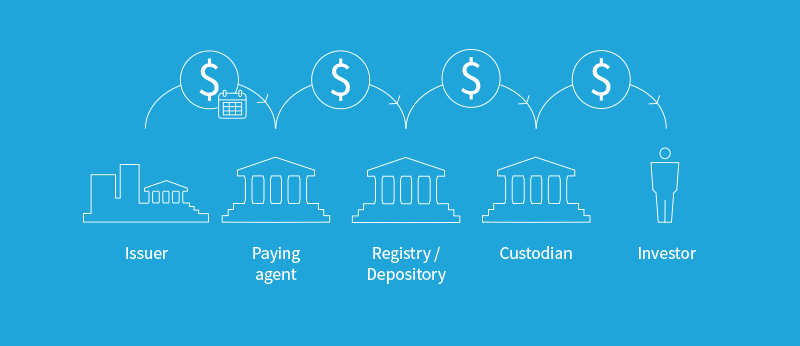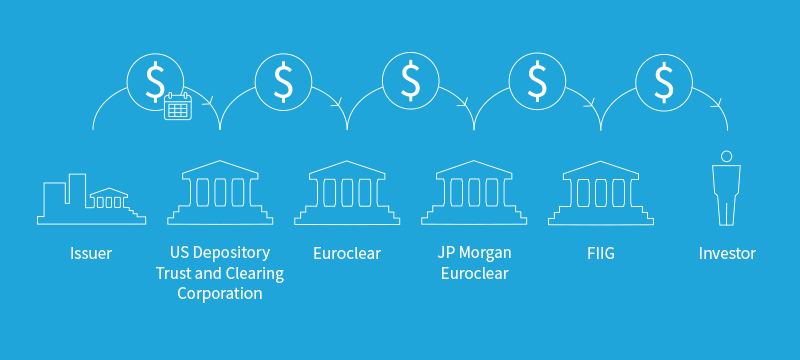How do I pay for my bonds?
The easiest way to pay for your bonds is via the FIIG Funding Account provided by Macquarie Bank. The FIIG Funding Account will act as a hub for your fixed income investments with FIIG and provide you significant benefits including:
- Same day settlement meaning you’ll continue to earn interest up until settlement day.
- Your cash holdings will be included in your MyFIIG reporting on our website at www.fiig.com.au as well as on your monthly Holding Statement so you’ll be able to see your fixed income and cash holdings in one place.
- FIIG will pay funds directly into your FIIG Funding Account, making them speedily available.
- You’ll earn interest on funds held in your FIIG Funding Account.
- If there’s a delay between transactions when switching bonds (selling one bond and buying another), funds may be deposited in your interest bearing FIIG Funding Account. These funds will earn interest between transactions.
How do I buy bonds?
The vast majority of bonds are traded in the over the counter (OTC) market and you need to find a bond broker to trade on your behalf. FIIG is a bond broker so we can facilitate you buying and selling direct corporate bonds.
With our DirectBonds service you can access around 400 corporate bonds from well known companies like Qantas, BHP and Sydney Airport. Wholesale qualified investors can also invest in foreign currency denominated bonds, including USD, GBP and Euro bonds.
You can find out more about our DirectBonds service here.
What is a Custodian and why do I need one?
When you buy bonds in the over-the-counter (OTC) market, you are required to hold them in the safe keeping of a licensed custodian until they mature or you decide to sell them.
CHESS, a company owned by the ASX, is one example of a custodial service provider for financial products such as shares, warrants and units in trusts. However, CHESS does not cater for OTC bonds.
Licensed custodial service providers hold an electronic record of an investor’s beneficial ownership of a bond. In addition, custodial service providers may also provide a variety of related services including:
- account administration;
- transaction settlements;
- collection of payments; foreign exchange; and
- reporting.
FIIG is authorised pursuant to its Australian Financial Services Licence issued by ASIC to provide custodial services for its clients.
Do I get a certificate to show that I own a bond?
No you don’t. Your licensed custodian will keep an electronic record of your ownership of the bonds. When you invest with FIIG, we provide you with trade confirmations and monthly statements so you can always check what bonds you own. You can also see your holdings 24/7 via our secure website, MyFIIG, along with a range of additional reporting related to your holdings.
How do I sell my bonds
The vast majority of bonds are traded in the over the counter (OTC) market and you need to find a bond broker to trade on your behalf. FIIG is a bond broker so we can so we can facilitate you selling direct corporate bonds as part of our DirectBonds service.
Do I have to keep my bonds until maturity
No you don’t. You can sell your bonds whenever you choose and we will sell the bonds on your behalf.
What is the difference between buying bonds directly and using a fund
When comparing investing in bonds directly or via managed funds it is important to consider the costs of each option and how you will be paid.
Unlike managed funds where you pay ongoing management, performance and entry or exit fees, the cost of buying and selling via the Over the Counter market is included in the price you will pay or receive for a bond. It’s similar to buying foreign currency where the bank takes a margin between the buy and sell price.
Another difference between buying bonds directly and using a fund is how you will be paid interest and at a bond’s maturity. By investing directly, you know when to expect your interest income whereas with a fund you have to wait for the fund manager to make a distribution. And when bonds mature you are repaid the face value of the bond and any outstanding interest rather than having to sell your units in a managed fund and accept the fund’s price at the time of sale.
How will I receive my coupon payments?
Coupons are paid by the issuer to bond holders on the dates specified when the bond was issued. Coupons are paid to bond holders recorded on the registry at record date.
Coupon payments are generally made as follows:

The process is the same for repayments of bonds that have been called or have reached final maturity date.
In the ordinary course of business, (weekends and public holidays notwithstanding), a FIIG investor should expect to receive payment as follows:
- For Domestic AUD Bonds (ie. Bonds issued by Australian corporations, agencies or governments and denominated in Australian dollars), investors will receive payment by the specified date +1 business day
- For AUD Eurobonds (ie. Bonds issued by International corporations, agencies or governments and denominated in Australian dollars), investors will receive payment by the specified date +2 business days
- For Non-AUD Eurobonds, (ie. Bonds issued by International corporations, agencies or governments and denominated in a foreign currency such as USD, GBP or EUR) investors will receive payment between 2 to 4 business days after the specified date
What is a Eurobond?
A Eurobond is a bond issued in a currency other than the currency of the country or market in which it is issued. For example, an Australian company issuing a bond in USD that cannot be sold to US investors would be classed as a Eurobond.
Why do I receive coupon payments for Eurobonds after the specified date?
Eurobonds are paid later than the specified date due to time zone differences and differing local cut off times of banks, custodians and clearing houses. For example, coupons for AUD Eurobonds are paid in the European trading day after local Australian banks have closed.
A USD coupon payment may need to pass through the following stages:

Generally bond holders will receive a USD coupon payment between 2 to 4 business days after the specified date. Delays may occur at each stage of the process which may add an extra business day or two, without need for concern. If we expect the coupon payment to be delayed by more than 4 business days, we will notify you and give you any information as it becomes available.
How are bonds taxed?
Generally, coupon income from bonds is subject to income tax. Capital gains may also be subject to tax. Investors should seek independent taxation advice specific to their circumstances.
How do I find out the current value of my bonds?
FIIG will provide you with bond valuations.
Each month we will send you monthly statements with valuations for your portfolio. You can also access valuations anytime via MyFIIG
Will I have to pay stamp duty when I buy and sell bonds?
In most cases stamp duty is not payable on bond transactions.
How and when do I pay for a bond purchase?
Unlike shares there is no exchange for most bond trades and brokers will find buyers and sellers who negotiate prices. Settlement for purchases and sales takes place two business days (T + 2) after the contract is issued (being the day upon which the transaction was made). You will be issued with instructions on where the funds should be sent to settle the transaction.
How and when do investors receive funds on maturity?
Typically the face value of the bond plus the final coupon is paid to the investor's account on the agreed maturity date (being either a call date or final maturity date) or the custodian.